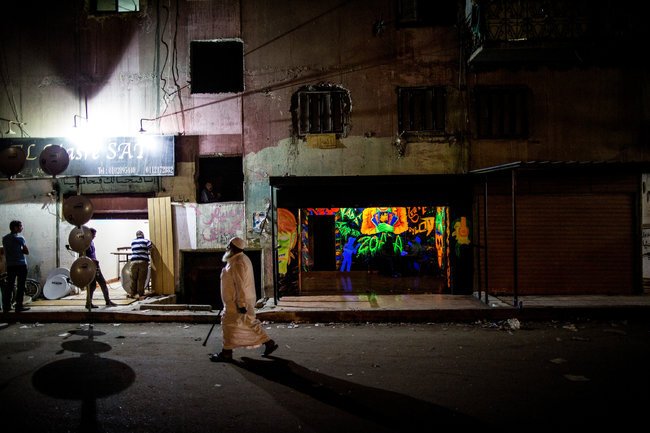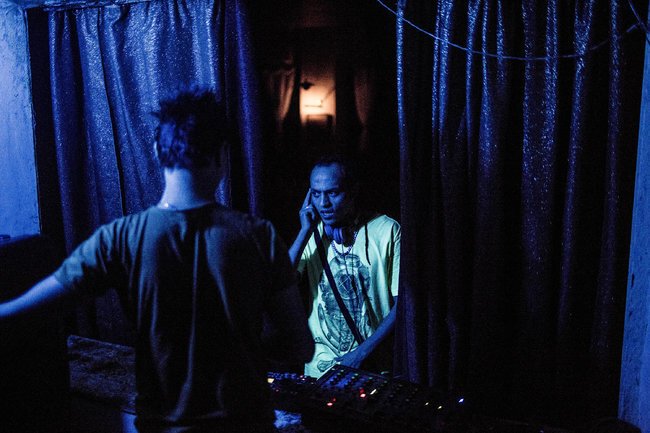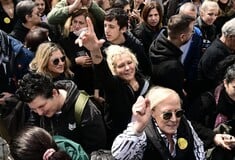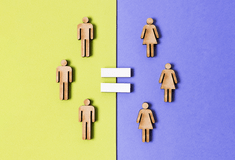
A Cairo recording studio used by the singer Sadat Abdel-Aziz and the musicians who call themselves Amr Haha and Alaa 50 Cent.
Εgypt's Music Revolution
THE NEW YORK TIMES
CAIRO — One washed towels in a barbershop. The other sold fast food. Some nights, they would grab the microphones at outdoor weddings and try out raps they had written, only to earn a hail of stones.
Now they are among the fastest-rising stars in Egypt, the Arab world’s most populous nation and its largest music market. Under the names Okka and Ortega, they play sprawling shows in Egypt and abroad.
In just a few years, these and other young musicians have created a new genre of youth-driven, socially conscious music and forced it on the Egyptian soundscape.
Their music predated the political revolution that ousted President Hosni Mubarak in February 2011, and most of the musicians did not join the uprising in Tahrir Square. But the turmoil since has left Egypt’s huge youth population searching for voices that address issues they care about.
Half of Egypt’s 85 million people are under 25, and many found what they were looking for in the raucous, defiant new music known as “mahraganat,” Arabic for “festivals.” The songs’ addictive beats helped, too.
“We made music that would make people dance but would also talk about their worries,” said Alaa al-Din Abdel-Rahman, 23, better known as Alaa 50 Cent. “That way everyone would listen and hear what was on their minds.”
The music is a rowdy blend of traditional Egyptian wedding music, American hip-hop and whatever else its creators can download for free online. The singing is fast, often improvised and heavily doctored with Auto-Tune.
The songs have racked up millions of views on YouTube and have won their creators international shows and appearances in Arab films and television commercials. In Cairo, their sound is everywhere, blasting from taxis, rocking boats on the Nile and jangling from cellphones.
The music’s swift rise from the alleys of neglected Cairo neighborhoods to car stereos and high-class weddings and even television commercials reflects the profound shifts in Egyptian society since the revolution. More people are looking for open discussion of social issues and willing to reach across class lines to find it. Like the revolution, the music came from young people who looked at their lives and did not see much to look forward to. So they made noise, spread their ideas through social media and were surprised by the results.
Mr. Abdel-Rahman and his partner, the singer Sadat Abdel-Aziz, 26, grew up in the Cairo neighborhood of Medinat al-Salam, a poor, drug-ridden district of rundown apartment buildings. The pair have always had two musical goals, they said, to talk about life in their neighborhood and to make people dance.
“I could sing at a street party, dancing, but touch on the situation that I am in and that we all feel,” Mr. Abdel-Aziz said on a recent evening, standing in the trash-strewn, unpaved lane leading to his apartment, his long braids tied behind his head.
In 2008, the pair teamed up with a shy young man named Amr Muhammad, who had a knack for manipulating sound with pirated software. Now a sought-after sound guru known as Amr Haha, he is widely credited as one of the prime creators of the mahraganat sound.\
The group’s early songs dealt with hashish, sex, friendship and deception, not politics. That changed when the anti-Mubarak uprising erupted in January 2011, and Mr. Abdel-Aziz sang a song called “The People and the Government.”
“The people and the government, the machine guns and clubs
Egypt rose up, and even those who didn’t steal dove into it
I’ll talk about those standing, the survivors and the dead
I’ll talk about the church, the mosque and the Brotherhood.”
Young revolutionaries, seeking a soundtrack to their movement, sought them out. They were soon invited to perform abroad and at fancier Egyptian locations.
They have since tackled other social issues, often with a healthy dose of mischief. When sexual harassment and abuse became an issue at street protests, they addressed the subject, perhaps not as women’s groups would have liked, with a song called “Hit on Her, Yes. Harass Her, No.”
And as Egypt’s economy slowed, they subverted the famous protest chant — “The people want the fall of the regime” — with a more worldly demand: “The people want five pounds cellphone credit.” (Five Egyptian pounds is about 70 cents.)
The rise of a musical style considered the domain of the poor has surprised many, including Mr. Abdel-Aziz’s neighbors, though they understand the appeal.
“People found something new in the music,” said Ayman Abu Bilal, 41, a butcher who watched Mr. Abdel-Aziz grow up. “You don’t understand three-fourths of the lyrics, but then you hear a something good and realize the whole song relates to you.”
Arab popular music has long been dominated by beautiful stars who croon about love and heartbreak and market themselves with music videos shot in luxurious settings that many Egyptians will never visit. Mina Girgis, an Egyptian ethnomusicologist, said that left a wide opening after the revolution for music more in touch with its audience.

“I’m not going to listen to cheesy pop songs when people are dying, but I will listen to songs about social problems,” he said. “So there was a void and people were looking for a sound that echoed what they were living.”
Groups in other genres, like folk and rock, have also addressed social issues, but lack the mass appeal of mahraganat. Some critics find the rise of mahraganat indicative of a societal decline since the revolution.
“May God end my life,” said Hilmy Bakr, a prominent member of the musicians’ syndicate, raising his voice until his face turned red. “How do people know the society is crumbling? When these songs become best sellers.”
Of the new stars, none have risen higher — and infuriated Mr. Bakr more — than Okka and Ortega.
The pair, whose real names are Muhammad Salah and Ahmed Mustafa, started out as rappers, writing rhymes about their neighborhood and paying by the hour to record on computers in Internet cafes.
They made their first mahraganat song as a joke and were surprised when it spread: soon after, a cart blasting the song passed them on the street, and they chased down the driver to tell him it was theirs. He thought they were joking, they said.
They bought a computer for $400 so they could record at home, and they put their names in their next song so no other singers could steal it.
Two more of their songs went viral, so they hired a manager, stopped doing street weddings and started singing for commercials. So far, they have recorded songs for an Egyptian phone company, a frozen food line called Meatland and an Egyptian version of Viagra, known as “The Golden Box.”
While early on they flaunted their underclass credentials, they have since changed. On a recent night in their modest studio, they bragged of things to come: an album and music video on June 1, trips to the United States and elsewhere later this year, and a commercial for hair gel.
“We need to take this music to the whole world and tell those who used to insult us that we are not doing something stupid,” Mr. Mustafa said.
“I want to walk down the red carpet,” Mr. Salah said, strutting across the room and waving to an imaginary crowd. “I’m Okka!”

























